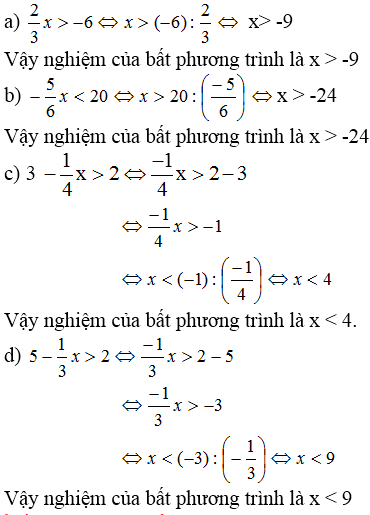Hãy nhập câu hỏi của bạn vào đây, nếu là tài khoản VIP, bạn sẽ được ưu tiên trả lời.

1) \(2\left(3x-1\right)-3x=10\)
<=> \(6x-2-3x=10\)
<=>\(3x-2=10\)
<=> \(3x=12\)
<=> \(x=4\)
Vậy tập nghiệm của pt S={4}
2) \(\dfrac{x+1}{x}+1=\dfrac{3x-1}{x+1}+\dfrac{1}{x\left(x+1\right)}\)
ĐKXĐ: x khác 0; x khác 1,-1
<=> \(\dfrac{\left(x+1\right)^2}{x\left(x+1\right)}+\dfrac{x\left(x+1\right)}{x\left(x+1\right)}\)= \(\dfrac{3x^2-x}{x\left(x+1\right)}+\dfrac{1}{x\left(x+1\right)}\)
=> \(\left(x+1\right)^2+x\left(x+1\right)\)= \(3x^2-x+1\)
<=> \(x^2+2x+1+x^2+x=3x^2-x+1\)
<=> \(x^2+x^2+2x+x-3x^2+x\)= \(1-1\)
<=> \(-x^2+4x=0\)
<=>\(4x=x^2\)
<=> \(4=x\) ( TMĐKXĐ)
Vậy tập nghiệm của pt S={4}
c) \(\dfrac{2x+1}{3}-\dfrac{3x-2}{2}>\dfrac{1}{6}\)
<=> \(\dfrac{4x+2}{6}-\dfrac{9x-6}{6}>\dfrac{1}{6}\)
<=> \(\dfrac{4x+2-9x+6}{6}-\dfrac{1}{6}>0\)
<=> \(\dfrac{-5x+7}{6}>0\)
Mà 6>0 . Nên \(-5x+7>0\)
Ta có \(-5x+7>0\)
<=> \(-5x>-7\)
<=> \(x< \dfrac{7}{5}\)
Vậy tập nghiệm của bất phương trình S={x thuộc R| \(x< \dfrac{7}{5}\)}
1)2.(3x-1)-3x=10
6x-2-3x =10
6x-3x =10+2
3x =12
x =4
Vậy S=4
2) \(\dfrac{x+1}{x}+1=\dfrac{3x-1}{x+1}+\dfrac{1}{x\left(x+1\right)}\)
Đkxđ: \(x\ne0\) và \(x\ne-1\)
MTC;x(x+1)
\(\dfrac{x+1}{x}+1=\dfrac{3x-1}{x+1}+\dfrac{1}{x\left(x+1\right)}\)
\(\Leftrightarrow\)\(\dfrac{\left(x+1\right)\left(x+1\right)+x\left(x+1\right)}{x\left(x+1\right)}=\dfrac{x\left(3x-1\right)+1}{x\left(x+1\right)}\)
\(\Leftrightarrow\)(x+1) (x+1)+x(x+1) = x (3x-1)+1
\(\Leftrightarrow\)x2+x+x+1+x2+x =3x2-x+1
\(\Leftrightarrow\)x2+x+x+1+x2+x-3x2+x-1=0
\(\Leftrightarrow\)-x24x=0
\(\Leftrightarrow\)4x-x2=0
\(\Leftrightarrow\)x(4-x)=0
\(\Leftrightarrow\)x=0 hoặc 4-x=0
\(\Leftrightarrow\)x=0 hoặc x =4
3)\(\dfrac{2x+1}{3}-\dfrac{3x-2}{2}>\dfrac{1}{6}\)
\(\Leftrightarrow\)\(\dfrac{2x+1}{3}6-\dfrac{3x-2}{2}6>\dfrac{1}{6}\)6
\(\Leftrightarrow\)2(2x+1)-3(3x-2)>1
\(\Leftrightarrow\)4x+2-9x+6>1
\(\Leftrightarrow\)4x-9x>1-2-6
\(\Leftrightarrow\)-5x>-7
\(\Leftrightarrow\)-5x.\(\dfrac{1}{-5}>-7.\dfrac{1}{-5}\)
\(\Leftrightarrow x>\dfrac{7}{5}\)

a: \(\Leftrightarrow20x^2-12x+15x+5< 10x\left(2x+1\right)-30\)
\(\Leftrightarrow20x^2+3x+5< 20x^2+10x-30\)
=>3x+5<10x-30
=>-7x<-35
hay x>5
b: \(\Leftrightarrow4\left(5x-20\right)-6\left(2x^2+x\right)>4x\left(1-3x\right)-15x\)
\(\Leftrightarrow20x-80-12x^2-6x>4x-12x^2-15x\)
=>14x-80>-11x
=>25x>80
hay x>16/5

c: \(\Leftrightarrow2x-8>=2x+1\)
=>-8>=1(vô lý)
d: \(\Leftrightarrow20x^2-12x+15x+5< 10x\left(2x+1\right)-30\)
\(\Leftrightarrow20x^2+3x+5< 20x^2+10x-30\)
=>10x-30>3x+5
=>7x>35
hay x>5

a) ĐKXĐ: \(x\ne-1,x\ne0\)
Ta có: \(\dfrac{x+3}{x+1}+\dfrac{x-2}{x}=2\)
<=> \(\dfrac{x\left(x+3\right)+\left(x-2\right)\left(x+1\right)-2x\left(x+1\right)}{x\left(x+1\right)}=0\)
<=> \(\dfrac{x^2+3x+x^2-x-2-2x^2-2x}{x\left(x+1\right)}=0\)
<=> \(\dfrac{-2}{x\left(x+1\right)}=0\) (vô lí)
=> pt vô nghiệm
b) ĐKXĐ: \(x\ne3,x\ne-2\)
ta có:\(1+\dfrac{x}{3-x}=\dfrac{5x}{\left(x+2\right)\left(3-x\right)}+\dfrac{2}{x+2}\)
<=> \(\dfrac{\left(x+2\right)\left(3-x\right)+x\left(x+2\right)-5x-2\left(3-x\right)}{\left(x+2\right)\left(3-x\right)}=0\)
<=> \(\dfrac{x-x^2+6+x^2+2x-5x-6+2x}{\left(x+2\right)\left(3-x\right)}=0\)
<=> \(\dfrac{0}{\left(x+2\right)\left(3-x\right)}=0\) (luôn đúng)
Vậy pt trên luôn đúng với mọi x khác 3 và -2
a) \(\dfrac{x+3}{x+1}\)+\(\dfrac{x-2}{x}\)=2
(đk: x\(\ne\); x\(\ne\)-1)
<=> \(x^2\)+3x + \(x^2\)-x -2 =\(2x^2\)+2x
<=> 2x -2 =2x
<=>0x=2
=>Pt vô nghiệm.
b) 1+ \(\dfrac{x}{3-x}\)= \(\dfrac{5x}{\left(x+2\right)\left(3-x\right)}\)+\(\dfrac{2}{x+2}\)
(đk:x\(\ne\)3; x\(\ne\)-2)
<=> 3x +6=3x+6
<=>0x=0
=> Pt vô số no.
c)\(\dfrac{3x+2}{3x-2}\)-\(\dfrac{6}{2+3x}\)=\(\dfrac{9x^2}{9x^2-4}\)
(đk: x\(\ne\)\(\pm\)\(\dfrac{2}{3}\))
<=>\((3x+2)^2\)-6(3x-2)=\(9x^2\)
<=>\(9x^2 \)+12x +4 -18x+12=\(9x^2\)
<=>16-6x=0
<=>6x=16
<=> x=\(\dfrac{8}{3}\)(t/m)
Vậy pt có no duy nhất là x=\(\dfrac{8}{3}\)

giải luôn ko chép đề nhé
a,
<=>(3x-5)(x-1)=(3x+1)(x-2)-3(x-1)
<=>3x^2-8x+5=3x^2-5x-2-3x+3
<=>3x^2-8x-3x^2+5x+3x=-5+3
<=>0x=-2
vậy s=\(\varnothing\)

a) 1x−3+3=x−32−x1x−3+3=x−32−x ĐKXĐ: x≠2x≠2
Khử mẫu ta được: 1+3(x−2)=−(x−3)⇔1+3x−6=−x+31+3(x−2)=−(x−3)⇔1+3x−6=−x+3
⇔3x+x=3+6−13x+x=3+6−1
⇔4x = 8
⇔x = 2.
x = 2 không thỏa ĐKXĐ.
Vậy phương trình vô nghiệm.
b) 2x−2x2x+3=4xx+3+272x−2x2x+3=4xx+3+27 ĐKXĐ:x≠−3x≠−3
Khử mẫu ta được:
14(x+3)−14x214(x+3)−14x2= 28x+2(x+3)28x+2(x+3)
⇔14x2+42x−14x2=28x+2x+6⇔14x2+42x−14x2=28x+2x+6
⇔

3.
a) \(2x+5=20-3x\)
\(\Leftrightarrow2x+3x=20-5\)
\(\Leftrightarrow5x=15\)
\(\Leftrightarrow x=3\)
Vậy \(S=\left\{3\right\}\)
b) \(\left(2x-1\right)^2-\left(x+3\right)^2=0\)
\(\Leftrightarrow\left[\left(2x-1\right)+\left(x+3\right)\right]\left[\left(2x-1\right)-\left(x+3\right)\right]=0\)
\(\Leftrightarrow\left(2x-1+x+3\right)\left(2x-1-x-3\right)=0\)
\(\Leftrightarrow\left(3x+2\right)\left(x-4\right)=0\)
\(\Leftrightarrow\left[{}\begin{matrix}3x+2=0\\x-4=0\end{matrix}\right.\Leftrightarrow\left[{}\begin{matrix}x=-\dfrac{2}{3}\\x=4\end{matrix}\right.\)
Vậy \(S=\left\{-\dfrac{2}{3};4\right\}\)
c) \(\dfrac{5x-4}{2}=\dfrac{16x+1}{7}\)
\(\Leftrightarrow\left(5x-4\right)7=\left(16x+1\right)2\)
\(\Leftrightarrow35x-28=32x+2\)
\(\Leftrightarrow35x-32x=2+28\)
\(\Leftrightarrow2x=30\)
\(\Leftrightarrow x=15\)
Vậy \(S=\left\{15\right\}\)
d) \(\dfrac{2x+1}{6}-\dfrac{x-2}{4}=\dfrac{3-2x}{3}-x\)
\(\Rightarrow\left(2x+1\right)12-\left(x-2\right)18=\left(3-2x\right)24-72x\)
\(\Leftrightarrow24x+12-18x+36=72-48x-72x\)
\(\Leftrightarrow6x+48=72-120x\)
\(\Leftrightarrow6x+120x=72-48\)
\(\Leftrightarrow126x=24\)
\(\Leftrightarrow x=\dfrac{4}{21}\)
Vậy \(S=\left\{\dfrac{4}{21}\right\}\)

a/ ĐKXĐ: x khác 1; x khác - 2
pt <=> \(\dfrac{x-1}{\left(x+2\right)\left(x-1\right)}-\dfrac{2\left(x+2\right)}{\left(x+2\right)\left(x-1\right)}=\dfrac{4x-8}{\left(x+2\right)\left(x-1\right)}\)
\(\Leftrightarrow x-1-2x-4=4x-8\Leftrightarrow-5x=-3\Leftrightarrow x=\dfrac{3}{5}\left(tm\right)\)
Vậy........
b/ \(2x-3\ge5\Leftrightarrow2x\ge8\Leftrightarrow x\ge4\)
Vậy......
c,d tt
a. \(\dfrac{1}{x+2}-\dfrac{2}{x-1}=\dfrac{4x-8}{\left(x+2\right)\left(x-1\right)}\)
ĐKXĐ: \(x\ne-2;x\ne1\)
\(\Leftrightarrow\dfrac{1\left(x-1\right)}{x+2\left(x-1\right)}-\dfrac{2\left(x+2\right)}{x-1\left(x+2\right)}=\dfrac{4x-8}{\left(x+2\right)\left(x-1\right)}\)
\(\Rightarrow1\left(x-1\right)-2\left(x+2\right)=4x-8\)
\(\Leftrightarrow x-1-2x-4=4x-8\)
\(\Leftrightarrow x-2x-4x=-8+1+4\)
\(\Leftrightarrow-5x=-3\)
\(\Leftrightarrow x=\dfrac{3}{5}\)
Vậy \(S=\left\{\dfrac{3}{5}\right\}\)
b) \(2x-3\ge5\left(2\right)\)
\(\Leftrightarrow2x\ge8\)
\(\Leftrightarrow x\ge4\)
Vậy tập nghiệm của BPT (2) là \(x\ge4\)
c) \(\dfrac{2}{x+1}-\dfrac{1}{x-2}=\dfrac{2x-6}{\left(x+1\right)\left(x-2\right)}\)
ĐKXĐ: \(x\ne2;x\ne-1\)
\(\Leftrightarrow\dfrac{2\left(x-2\right)}{x+1\left(x-2\right)}-\dfrac{1\left(x+1\right)}{x-2\left(x+1\right)}=\dfrac{2x-6}{\left(x+1\right)\left(x-2\right)}\)
\(\Rightarrow2x-3-1-x=2x-6\)
\(\Leftrightarrow2x-x-2x=-6+3+1\)
\(\Leftrightarrow x=2\) (KTM)
Vậy pt vô \(n_o\)
d) \(3x-5\ge7\left(4\right)\)
\(\Leftrightarrow3x\ge12\)
\(\Leftrightarrow x\ge4\)
Vậy tập nghiệm của BPT (4) là \(x\ge4\)

a. 3x-1=x-5 <=> 2x=-4 <=> x=-2
Vậy tập no của phương trình là S={-2}
b.\(\dfrac{2x-1}{3}\)+\(\dfrac{3x-5}{4}\)=\(\dfrac{x-1}{5}\)
<=>40x-20+45x-75=12x-12
<=>73x=83 <=> x= \(\dfrac{83}{73}\)
Vậy tập no của phương trình là S={\(\dfrac{83}{73}\)}
c.(2x-6)(x+20)=0
<=> 2x-6=0 hoặc x+20=0
1) 2x-6=0 <=> x= 3
2) x+20=0 <=> x=-20
Vậy tập no của phương trình là S={-20 ; 3}
d. \(\dfrac{x-3}{x+3}\)+\(\dfrac{x+3}{x-3}\)=\(\dfrac{2x\left(x+1\right)}{x^2-9}\)
ĐKXĐ: x ≠ 3 và x ≠ -3
Ta có \(\dfrac{x-3}{x+3}\)+\(\dfrac{x+3}{x-3}\)=\(\dfrac{2x\left(x+1\right)}{x^2-9}\)
<=> (x-3)2 + (x+3)2 = 2x2+2x
<=> x2 -6x +9 +x2 +6x +9=2x2+2x
<=> 2x=18 <=> x=9
Vậy tập no của phương trình là S={9}

ĐKXĐ: \(x\ne1,-1\)
Ta có: \(\dfrac{x-2}{x+1}\ge\dfrac{3x+2}{x-1}-2\)
\(\dfrac{x-2}{x+1}\ge\dfrac{3x+2-2\left(x-1\right)}{x-1}\)
\(\dfrac{x-2}{x+1}-\dfrac{3x+2-2x+2}{x-1}\ge0\)
\(\dfrac{x-2}{x+1}-\dfrac{x+4}{x-1}\ge0\)
\(\dfrac{\left(x-2\right)\left(x-1\right)-\left(x-4\right)\left(x+1\right)}{x^2-1}\ge0\)
\(\dfrac{x^2-3x+2-x^2+3x+4}{x^2-1}\ge0\)
\(\dfrac{6}{x^2-1}\ge0\)
\(\Rightarrow x^2-1>0\Leftrightarrow x^2>1\Leftrightarrow\left\{{}\begin{matrix}x< -1\\x>1\end{matrix}\right.\)(TM)
\(BPT\Leftrightarrow\dfrac{\left(x-2\right)\left(x-1\right)}{\left(x+1\right)\left(x-1\right)}\ge\dfrac{\left(3x+2\right)\left(x+1\right)}{\left(x+1\right)\left(x-1\right)}-\dfrac{2\left(x+1\right)\left(x-1\right)}{\left(x+1\right)\left(x-1\right)}\)
\(\Rightarrow x^2-x-2x+2-3x^2-3x-2x-2-2x^2-2\ge0\)
\(\Leftrightarrow-4x^2-8x-2\ge0\)
\(\Leftrightarrow x^2+2x+\dfrac{1}{2}\ge0\)
\(\Leftrightarrow\left(x+1\right)^2-\dfrac{1}{2}\ge0\)
Vậy bất phương trình luôn đúng \(\forall x\).